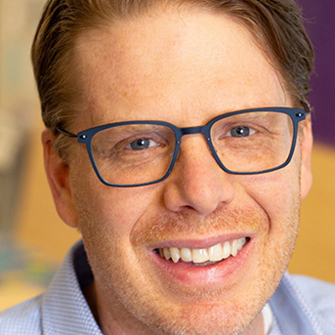Defining Childhood in the Age of Tech
 Researchers explored the meaning of childhood in a tech-infused world during the Association for Computer Machinery’s annual Interaction Design and Children (IDC) Conference at Northwestern University.
Researchers explored the meaning of childhood in a tech-infused world during the Association for Computer Machinery’s annual Interaction Design and Children (IDC) Conference at Northwestern University.
Chaired by Michael Horn, professor of learning sciences at the School of Education and Social Policy and professor of computer science at the McCormick School of Engineering, the five-day conference asked researchers, practitioners, graduate students––and young people themselves–– to critically examine the pervasive role of technology in children’s daily lives, from education and learning to entertainment and health.
 “I was especially excited to have high school students join us from across the country to share their work,” said Horn (pictured left), who codirects the Center for Computer Science and Learning Sciences with Uri Wilensky, the Lorraine Morton Professor of Learning Sciences and Computer Science; and Chris Riesbeck, associate professor of computer science at Northwestern Engineering.
“I was especially excited to have high school students join us from across the country to share their work,” said Horn (pictured left), who codirects the Center for Computer Science and Learning Sciences with Uri Wilensky, the Lorraine Morton Professor of Learning Sciences and Computer Science; and Chris Riesbeck, associate professor of computer science at Northwestern Engineering.
Sessions during the June conference covered augmented and virtual reality, computational and data literacy, child safety and wellbeing, natural language processing, robotics, co-design, multisensory learning, and more.
Highlights:
- In the “STEAM Tools for Learning” session, Horn, Wilensky, John Chen, a computer sciences and learning sciences (CS+LS) doctoral student, and Lexie Zhao, a learning sciences doctoral student, presented The Pocketworld Playground: Engaging Online, Out-of-School Learners with Agent-based Programming, which demonstrated how to interest young people who were not in school but online in computational and complex systems thinking.
- Marcelo Worsley, assistant professor of learning sciences at SESP, and assistant professor of computer science at Northwestern Engineering, co-organized the “For Maker’s Sake: A Somatic Exploration of Making” workshop with Northwestern graduate students Meg Butler (learning sciences), Stephanie T. Jones (computer science and learning sciences), Sarah Priscilla Lee, (learning sciences); undergraduate Zoe Lewis (learning sciences, entrepreneurship, and Spanish); and alumnus Tyler Nanoff, a doctoral student in mechanical engineering at the University of Michigan.
- Horn helped organized the inaugural Learning, Design, and Technology Symposium, which examined topics such as human-computer interaction, artificial intelligence, and digital literacy. Horn and Northwestern alumnus and software engineer Cameron Roberts presented When Literacies Collide: The Role of Translation in Music+ Coding Activities, which looked at combining computer coding and music.
- Wilensky, Bruce Sherin, professor of learning sciences at SESP, and a team from Utah State University discussed their work co-designing a computational modeling lesson with an eighth-grade science teacher. The paper How Co-Designing Computational Modeling Activities Helped Teachers Implement Responsive Teaching Strategies, detailed the teacher’s experience to help inform future collaborations.
- Demonstrations and art presentations were designed to provide hands-on experiences to promote and provoke debate around interactive technologies for children. Featured research included:
- “Digital Drum Circles: Relational CS Education through Music Making” by Horn and doctoral students Maddie Brucker (CS+LS), and Melanie West (learning sciences).
- “NetLogo AR: Bringing Room-Scale Real-World Environments Into Computational Modeling for Children” by Chen, Horn and Wilensky.
- Velo: Exploring Animal Behavior Modeling through Hybrid Robotics-Simulation Learning Experience” by graduate students Chen, Hummer, and Kritphong Mongkhonvanit (CS + LS).
- “Twist-Yay! - A Kinesthetic Play Experience Through a Mathematical Kinetic Sculpture” by Horn and graduate student Khushbu Kshirsagar (learning sciences).
- “PaintBall – Coding Sports Into Art for Cross-Interest Computational Connections” by Vishesh Kumar, a postdoctoral scholar in SESP, Worsley, and Safinah Ali (MIT Media Lab).